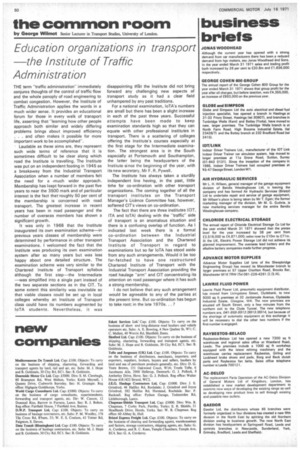Education organizations in transport the Institute of Traffic Administration
Page 52

If you've noticed an error in this article please click here to report it so we can fix it.
THE term "traffic administration" immediately conjures thoughts of the control of traffic flow and the whole panoply of road engineering to combat congestion. However, the Institute of Traffic Administration applies the words in a much wider sense. It provides an educational forum for those in every walk of transport life, asserting that "learning how other people approach both similar and widely differing problems brings about improved efficiency . . . and often makes it possible for more important work to be accomplished".
Laudable as these aims are, they represent such wide terms of reference that it is sometimes difficult to be clear along which road the Institute is travelling. The Institute was put on an independent footing in 1945 as a breakaway from the Industrial Transport Association when a number of members felt the need for a 'much wider approach. Membership has leapt forward in the past five years to near the 3500 mark and of particular interest is the fact that roughly 50 per cent of the membership is concerned with road transport. The greatest increase in recent years has been in road passenger and the number of overseas members has shown a significant growth.
It was only in 1968 that the Institute inaugurated its own examination scheme—in previous years cl3sses of membership were determined by pe-formance in other transport examinations. I welcomed the fact that the Institute was producing its own examination system after so many years but was less happy about one detailed structure. The examination scheme was very similar to the Chartered Institute of Transport syllabus although the first step—the Intermediate —was simplified into a single part instead of the two separate sections as in the CIT. To some extent this similarity was inevitable so that viable classes could be set up in local colleges whereby an Institute of Transport class could have its numbers augmented by loTA students. Nevertheless, it was disappointing di-at the Institute did not bring forward any challenging new aspects of transport study as it had a clear field unhampered by any past traditions.
For a national examination, loTA's numbers are small but there has been a slight increase in each of the past three years. Successful attempts have been made to keep examination standards high so that they can equate with other professional institutes in transport. There is a scattering of colleges offering the Institute's courses especially at the first stage for the Intermediate examination. The strongest area is in the South especially at Portsmouth and Southampton, the latter being the headquarters of the Institute since the beginning of the year, with its new secretary, Mr F. Ft. Pywell.
The Institute has always taken a sturdily independent line having, in the past, little tirne for co-ordination with other transport organizations. The coming together of all the transport institutes on the Transport Manager's Licence Committee has, however, softened CIT's views on co-ordination.
The fact that there are three institutes (CIT, ITA and loTA) dealing with the "traffic" side of transport is an anomalous situation and there is a confusing overlap of function, As I indicated last week there is a formal co-ordination between the Industrial Transport Association and the Chartered Institute of Transport in regard to examinations but so far loTA has stood aside from any such arrangements. Would it be too far-fetched to have one restructured Chartered Institute of Transport with the Industrial Transport Association providing the road haulage "arm" and CIT concentrating its attention on road passenger where it has such a strong membership.
I do not believe that any such arrangement would be agreeable to any of the parties at the present time. But co-ordination has begun to take root; in the late 1970s... ?




























































































